The Dental Business Guide Podcast Episode | February 16th
Arun Mehra and Kate Ford
Arun Mehra: Hello there now welcome back to the dental business guide podcast and today I’m joined by Kate Ford from Rudlings Wakelam Solicitors. Hi, Kate, how are you?
Kate Ford: Hi, I’m not too bad yourself?
Arun Mehra: Yeah. Good, good. Thanks. Now, Kate, what’s your background? What’s your experience.
Kate Ford: I’ve been a qualified solicitor for just under two years now. And I am originally from Liverpool but moved down to Norfolk a few years ago. And I’ve been with Rudlings for the past few years, where we’re quite an experienced firm when it comes to dental practices, or other health care transactions such as vets or doctors.
But I think dental is one of our biggest areas. And so we’re kind of fully equipped when it comes to all the various bespoke bits and bobs that arise when it comes to selling and purchasing dental practices.
Arun Mehra: All the nuances that I’ll I’m very well aware of indeed. So today, I’ve got a bunch of questions I want to ask you, for any listeners out there who are potentially buying a practice, whether it’s mixed, NHS or private. So I know one of the most popular questions we get all the time is: what is due diligence and why is it so important?
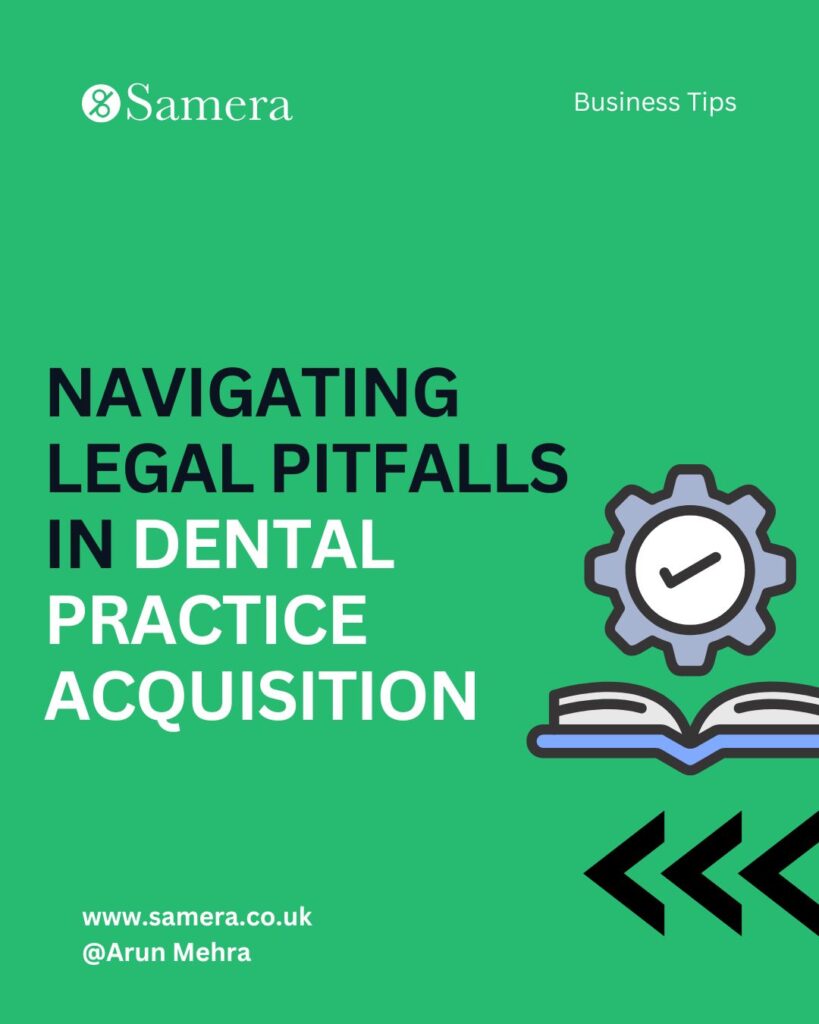
Due Diligence
Kate Ford: Yeah, so due diligence is just simply a term which is used to describe the gathering of information for a prospective buyer. It is basically one of the most important stages really, so that the buyer can decide if they most definitely do want to progress with the sale.
Due diligence is an aspect which requires a lot of patience and scrutiny. But essentially the better the due diligence stage is, the better equipped the buyer is. Without an investigation, the buyer would only be able to judge the practice on its face value, but also not be able to identify any potential issues or concerns which they hadn’t previously been aware of.
I always compared it to if you are buying a residential home, you wouldn’t proceed without looking into the title documents or the property searches. And it’s basically the same when you’re buying a practice. Due diligence is an exercise which allows the buyer to address issues or misconceptions or any worries that you may have.
Because a seller and the agents, they can paint quite a deceiving picture about a practice. Whereas, there could actually be some major elements both practically or from a legal point of view, which the buyer is essentially going to take on the responsibility for.
Arun Mehra: Totally, I kind of concur with that. I’ve been dealing with practice sales for many years. And as you mentioned, houses and house due diligence is relatively straightforward. But when you’re looking at business there’s so many aspects – it’s staffing, its contracts that you’ve signed up to, it’s legal, it’s so many things that can be there.
So you cannot not do a good thorough job. If you don’t do the due diligence, you really need to get the due diligence right and have the right solicitors and the right team to help you do this.
Kate Ford: Exactly. And as you said, there’s so many different aspects. Particularly when you’re purchasing, say, a large practice or a group of practices, you’ll usually have multiple legal departments involved. So you’ll have your employment solicitors, you’ll have your property solicitors, you’ll have the commercial solicitors because there’s just so much that forms a business that it’s hard to overlook it. It can be quite an error if a buyer doesn’t, because they’re essentially taking on the financial implications and they’re taking all the risks on it.
Action Point
Conduct thorough due diligence when buying a dental practice to uncover any potential issues and assess the practice’s true value, ensuring a sound investment.
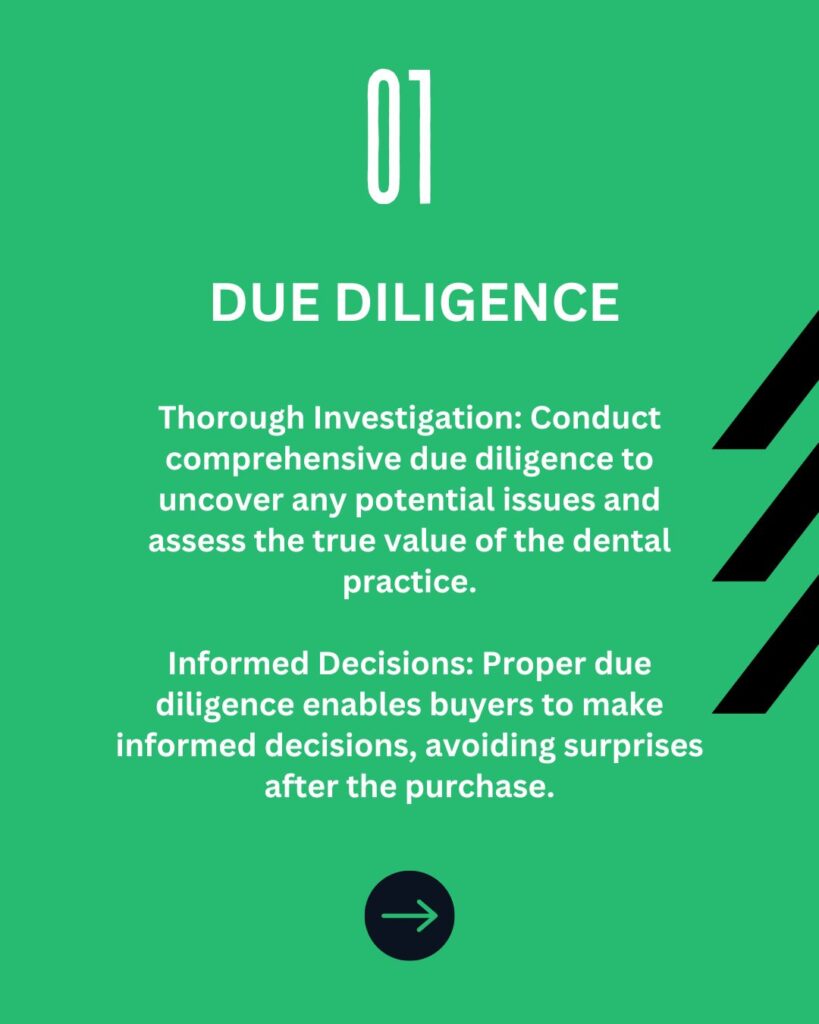
Contact us to find out more
Transferring an NHS Contract
Arun Mehra: Okay, so now, I’m a buyer, I have the due diligence done, and I’m buying an NHS practice. What are the most important things to consider when transferring the NHS contract over to me?
Kate Ford: Well, so the first thing to look at is whether the NHS contract is a GDS or a PDS contract, because that can seriously affect the time scale of the transaction.
So GDS contracts, you always hope to find because they’re usually a lot simpler and straightforward. Usually, the LAT requires three months to transfer a PDS contract. And if you haven’t taken that into account when you’re working out your timeline for the transaction, if you get to a point of completion and you haven’t notified the LAT that you’re transferring a PDS contract, then there’s an extra three months that you’ve got to add on to everything.
Whereas with GDS, it’s a lot more shorter and more straightforward. However, when you’re transferring a GDS contracts, there are some elements which buyers would probably not be aware of, in that there’s a specific route which you’ll take which is called ‘the partnership route’.
So the NHS aren’t informed that a seller is actually physically selling their practice. But instead, the seller and the buyer enter into a partnership. And so on completion, the seller and the buyer, they execute a partnership agreement. And then usually after a period of time, which is around a few months, the seller then retires from the partnership. And then the contract is transferred essentially into the sole name or the sole names of the buyer or buyers.
And the NHS, using this route, they only usually require a month’s notice to affect the change to the partnership. But, and typically when you have engaged solicitors, the solicitors are responsible for serving that notice, because we can line it up with the hopeful completion date. Because NHS are usually quite particular, they want the notice within 28 days off the first of the month. So it’s usually important to instruct a solicitor who’s familiar with, not only the notice periods, but the particular days that NHS want notices served.
Arun Mehra: Okay. So, in a nutshell, there is a process that has to be followed. And it’s important in my experience, that you have solicitors that understand the NHS nuances and contracts, because otherwise, it could take significantly longer if you don’t have that experience in your team correct?
Kate Ford: Yeah, definitely. And the NHS they have a kind of standard partnership agreement. Not a template, but they look for certain provisions, in which if you just have a buyer and a seller acting for themselves, and they don’t have a properly drafted partnership agreement, it’ll get rejected, which adds on just even further delay.
So as you say, it’s always very important to instruct a solicitor who is familiar with what the NHS are wanting. But bearing that in mind, if you’re purchasing an incorporated practice, then you don’t need to do any of that. And it’s just the case of purchasing their shares. Because essentially, the corporate body that’s party to the NHS contract, they don’t change at all. It’s just the owners of the corporate body.
And, of course, the NHS will need to know that there’s been a change of control of the limited company, but it’s a lot easier and a lot more straightforward to simply inform the NHS that the shareholders are changing, as opposed to a whole new partnership agreement drafted.
Action Point
For transferring an NHS contract, understand the type of contract (GDS or PDS) and the associated timescales. Consider the partnership route for GDS contracts to facilitate the transfer. Ensure proper notice is given to the NHS, adhering to their specific requirements and timelines. For incorporated practices, the process involves notifying the NHS of a change in company control, which is straightforward. Engage a solicitor experienced with NHS contracts to navigate the process efficiently.
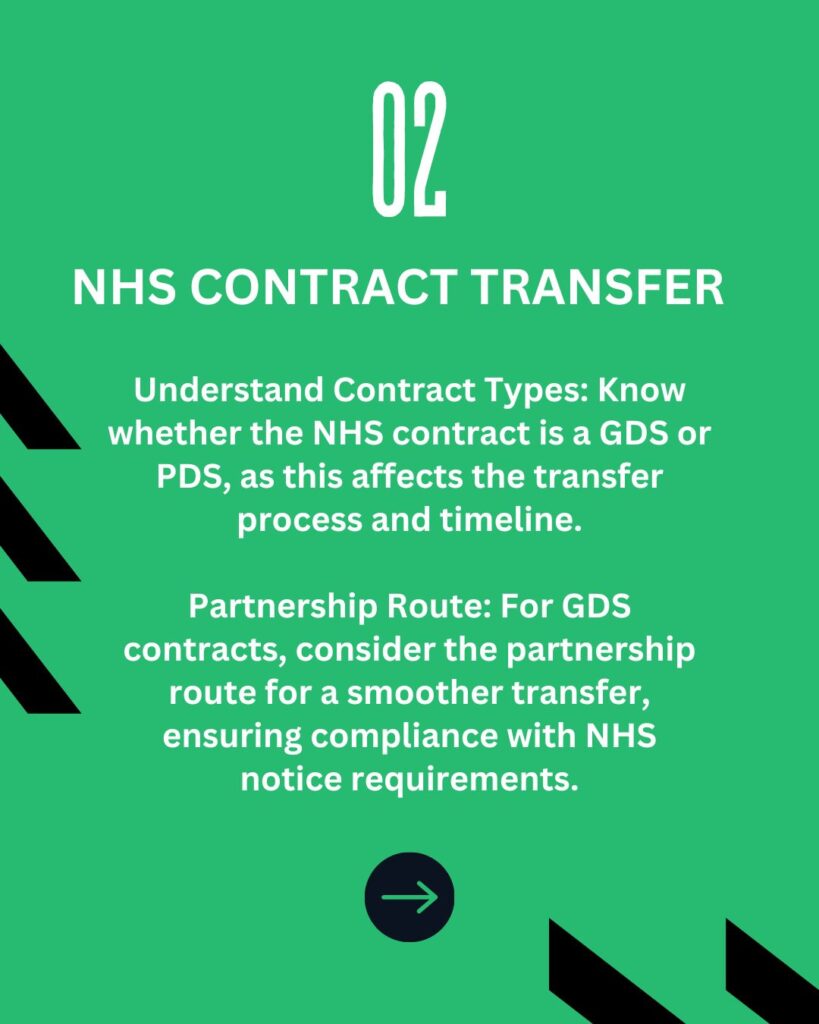
What Happens to the Staff?
Arun Mehra: Okay, cool. So now when I’m buying a practice on a question I always get from so many people is – I’ve got staff that I’m going to be taking on, do they all transfer automatically to me? Or can I move some staff on? What do what happens is this situation?
Kate Ford: Yeah, so I think employees and the employment obligations are often overlooked, because usually a practice will only have a small number of employees and you think, ‘Oh, I can just let them go and bring in my own employees. And it won’t be an issue.’ But there’s actually quite an important regulation which applies to this situation, which is called TUPE. And the TUPE regulations basically apply whenever there’s a transfer of an undertaking. So the sale of a business, therefore, applies under TUPE.
And so whenever a buyer is taking on a practice, all of the employees who are on payroll at the time of completion will transfer to the buyer. And it’s very important that the buyers are aware of the terms of each employee’s contract, if you will. And it’s important that they know that there are limitations to how they can firstly change any of these terms, and whether they can dismiss any of these employees. Because it may be the case that they don’t want to take on so many employees.
But if you dismiss one after completion, you’re making yourself very vulnerable to breaching the TUPE regulations. There’s also obligations on the sellers that they must consult with the employees and they must inform the buyer of all of the various details and all of the various terms concerning all of the employees. And it’s a situation where a lot of buyers get themselves into trouble because they don’t realise that after completion, they can’t change the terms of the under which the employees that have transferred over.
So it is very, very important that where there are employees involved, either solicitors or even HR advisors, they can guide buyers into how to negotiate TUPE regulations. Because annoyingly, they are a bit of a minefield, there are various obligations for various parties. And these obligations change depending on how big the practice is and how many employees there are. So, if there’s over 10 employees, the seller and the buyer have to do one certain thing. If there’s over 20, they have to do a different thing.
So it is definitely important just to, even if you you don’t want the solicitor to act for you for the entire transaction, but just at the outset to assess the employee’s situation, and just to confirm what your obligations will be, both before and after completion of the purchase.
Action Point
When buying a dental practice, all existing staff automatically transfer to the new owner under TUPE regulations, preserving their employment terms. Buyers and sellers must comply with specific obligations, including informing and consulting with employees about the transfer. Altering employment terms or dismissing transferred employees without just cause can violate TUPE regulations. It’s important for buyers to be aware of their responsibilities and possibly consult with legal or HR advisors for guidance.
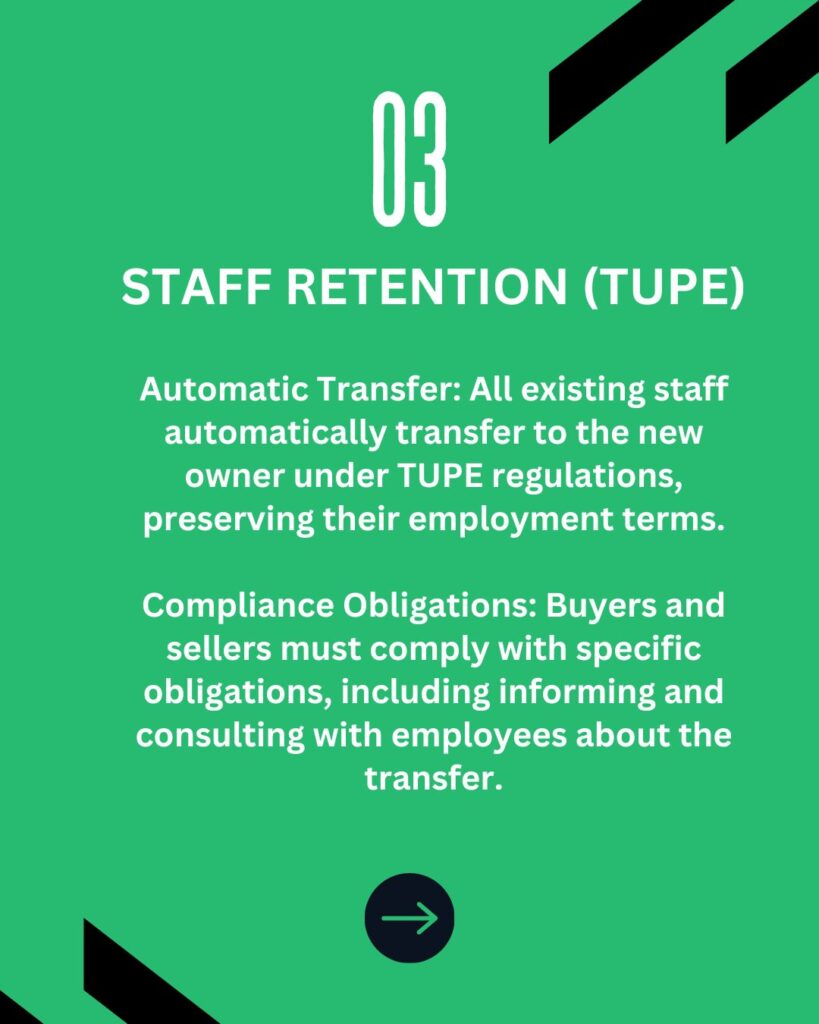
Indemnity and Warranties
Arun Mehra: Okay, fantastic. That’s very useful. So now in terms of when you get the sale and purchase agreement, I’ve seen so many in my time, there are lots of clauses in there and the ones that always stand out, the indemnity and warranties. What are they and why are they so important?
Kate Ford: Well, warranties and indemnities are essentially just a means of reallocating risk between the seller and the buyer. They’re also a really useful way of ascertaining important information and disclosures, which may not have been obvious from the due diligence process.
But warranties are essentially a number of statements about the business which confirm its position. And this can basically include matters like there haven’t been any litigation issues in the last two years, or the seller hasn’t dismissed any employees in the last year. If any statements are untrue, the seller can make disclosures against them, informing the buyer of any breaches of the warranties, and this will be put into a disclosure letter. Should the seller failed to disclose a particular breach of a warranty, then the buyer can issue a claim for this breach if they’ve suffered a loss.
So if there’s a statement, which says that the seller hasn’t dismissed any employees in the last year and they have done, and this particular employee issues a claim for unfair dismissal, after completion, the buyer is essentially responsible for that claim. And so any losses that they suffer, any damages they suffer, they can pursue the seller. Because you can say ‘you didn’t inform me of this properly, and you’ve breached a warranty’.
So it’s very important that when drafting the purchase agreement, that from a seller’s perspective, they’ll want as few as warranties as possible. And they’ll want to make sure that they disclose as much information as possible. And the buyer will want to make sure that there are more warranties in there because there are more elements that could be covered.
Now, indemnities are very similar. They, in principle, have the same meaning, but they offer an element of protection for the buyer. Usually warranties are general sweeping statements like ‘there have been no litigation matters in the last two years’, whereas indemnities cover specific issues. So say, for example, we take the employee that was dismissed before completion, they issued a claim, the buyer would want an indemnity to deal with that specific tribunal claim, in which the seller would make sure that the buyer is compensated pound for pound for that specific tribunal matter.
And essentially, we as lawyers, we consider indemnities blank checks. So when you’re acting for a seller, you don’t want any indemnities, you want to avoid them all. Because it could be quite costly for the seller. But for a buyer, if there are any significant, specific issues, you want to make sure that they are all covered in the indemnity to make sure that your client is covered, if they do incur a risk to the most amount as possible.
Action Points
Warranties and indemnities reallocate risk in business transactions. Warranties are statements on the business’s condition, with sellers required to disclose any inaccuracies. Indemnities provide specific protection, compensating buyers for certain losses. Sellers aim to limit these clauses to reduce potential costs, while buyers seek them for protection against future liabilities.

Contact us to find out more
Defective Work
Arun Mehra: Okay. Very helpful. So now if I’m a buyer, or even a seller, there’s always gonna be work that hasn’t been finished or completed and how is that apportioned? And also what happens in respect of defective work as well? Is there a claim that could be made against those? Or does it come under warranties or indemnities again?
Kate Ford: Yes. So one unusual thing about a dental transaction is that there’s usually quite a substantial section of the purchase agreement which deals with apportionments. And for some reason with other businesses, there isn’t so much of a focus. But with dental work, as you know, dentists will sometimes you have advanced payments, sometimes you’ll have a lot of uncompleted work that will be going on at the time of completion. And there’ll be customers or patients who aren’t happy with treatment that they received before completion, but now the buyer is responsible for them.
And the main way to deal with it will be through the purchase agreement and the negotiation process. So essentially, the buyers and the sellers will have to come to an agreement of how to deal with each matter individually. So for example, advance payments, you’ll have to assess whether all advance payments will stay with the seller, or if they’re going to be to the buyer wholly or if they’re going to be split 50/50. There isn’t a set format, it’s just more kind of who wins the negotiations.
Usually you find that work that’s already been started but hasn’t yet been paid for, if all of the works been completed, and none of the fees have been paid, all of those fees will be apportioned to the seller. And essentially, the buyer pays the seller after completion for those specific bits of work. Whereas, if there’s part of the work has been done, but part hasn’t been done, there’ll be a percentage split once the payments been received.
You also have to think of apportionment of monthly BSA payments. Typically, they’re split on a day rate. So if completion falls on the 15th of the month, then they’ll be split to 15 days and 15 days. You have to think about underperformance of targets. At the moment with COVID, obviously the NHS have changed their targets. But if before completion, your due diligence has shown that there will likely be an underperformance because of the seller, quite often there’s a retention which is included in the purchase agreement.
So the buyer gets to hold on an additional piece of money which the seller pays. And if there is, in fact, an underperformance the buyer can keep that money. But if in fact, the buyers work fairly hard, they only keep a proportion of that money and they pay back the remainder to the seller. So it’s all things which there isn’t a set format for that this is how it will work. But it’s more negotiations. And so it’s good to get an an experienced solicitor, who’s familiar with all of these bespoke things that dental practices incur, and who knows how to properly negotiate them.
Action Points
In dental transactions, handling unfinished or defective work involves negotiating terms within the purchase agreement. Buyers and sellers must agree on how to apportion costs for advanced payments, incomplete work, and underperformance issues. This often includes dividing advance payments, allocating fees for partially completed work, and considering underperformance retentions. The process is highly negotiated, with no set format, emphasizing the need for experienced legal guidance to navigate these unique aspects effectively.

Reviewing the Property
Arun Mehra: Okay. All right. And then the last couple of questions here, Kate. Properties are always a large part of the transaction quite often, whether it’s a freehold or whether it’s a leasehold. What are the top tips in terms of reviewing the property carefully?
Kate Ford: Yes, so obviously, when you come to purchase a practice, it’s always good to assess whether you want to purchase the freehold or just take out a leasehold. It may be the case that you don’t have any choice in the matter. But both freehold and leasehold give you pros and cons depending on your personal situation.
Obviously, freehold you have a lot more autonomy in relation to how the property is dealt with. But leasehold, you’re only obligated to hold that property for a fixed period of time. And little things like if there’s an issue with the roof, generally the landlord’s responsible for it. Whereas, if you own it, it’s your responsibility.
And so this is where due diligence again comes back into it. It’s just so important to to know exactly what you’re taking on a property is such a large asset, it’s usually the largest asset of a dental practice. If you own it outright and something goes wrong, that’s a substantial bill that you’re going to have to fit.
And if it’s a lease holder, however, you won’t be responsible for the major repairs. But if you breach the lease, you could be in breach. And so it’s always just best to, if you’re purchasing a property, double check over the title deeds. Because there may be rights which your neighbor has a right of access over, which you may not be familiar with. And the practice owner may not be familiar with. But there’s this right there. And if you stop a neighbor using that particular right of access, then you could have a serious financial liability on your hands.
Similarly, there may be covenants which the property is bound by. And if you breach that covenant, the person who benefits from that could then again issue you for breach of Covenant, and you’d be faced with a significant financial responsibility.
There are also property searches, which are a really useful way of not only knowing more about your property, but the surrounding area. And there are a lot of searches that we can undertake, where it will show you all the nearby commercial property. So it may be other dentists or GPS, or shops, which may affect how you want to carry out your business.
So it isn’t just whether your property is connected to mains drainage, but also other things like, there’s a development proposed on a couple streets over which may mean more patients, which could really benefit your business. Or it could be that around the corner there’s a very large dental practice, which you may think well actually ‘I don’t want to be competing with them, I’m not going to proceed’. So it may look like a great property on the face of it. Or it may look like a bad property on the face of it. But having these property searches and doing a full review of the title documents can really make or break your business.
Action Plan
When reviewing property for a dental practice transaction, consider the type of ownership (freehold vs. leasehold) and its implications for autonomy and responsibility. Conduct thorough due diligence to understand property rights, covenants, and potential liabilities. Review title deeds and undertake property searches to gain insights into the property and surrounding area, including commercial competitors and potential developments that could impact your business. This comprehensive approach ensures informed decisions and can significantly influence the success of your dental practice.

Buying the Practice You Work In
Arun Mehra: All right, cool. And then I suppose one of the things that I see all the time is that there are a lot of buyers out there who are actually working in the practice that they intend to end up buying. So do they have to go through this whole process as well? What would you recommend?
Kate Ford: Yep. So as you say, it happens so often that an associate will come into a position where they can either purchase the practice outright, or quite often will be able to buy into a practice. And there’s this misconception that because I work for a practice, either as an employee or self-employed contractor, that because I work for them, I don’t actually need to carry out any reviews, I don’t need to go through this long arduous due diligence process or going through the negotiations with the purchase agreement.
But often, there’ll be elements of a business where the practice owner doesn’t want to disclose it to all of its employees and all of its contractors. For example, litigation matters, as an employee myself, if my employer has a litigation matter, or an employee unemployment matter, often, they’re obligated not to disclose that information to other employees or other contractors, because it doesn’t involve me.
And going back to the property as well, there’ll be property elements, which I myself am not party to, until I do those reviews, or ask the seller to provide me that information. When you’re buying a practice, you want to make sure that you pay the market value for it. And without doing a full review, you won’t actually know if the practice is trading well, or if it’s trading really well.
So doing the due diligence process and doing the negotiations process, you know exactly what you’re buying into, or what you’re purchasing. You know how the business is doing and how it’s trading, so that you can project what your profits are going to be once you own it. And you can also just make sure that you’re entering into this deal on the best terms that you want to be party to. It is just so important.
As we said earlier, there are so many elements that make up a business. It isn’t just a property where you purchase bricks and mortar, you’re buying employment contracts, you’re buying supply and maintenance contracts, you’re buying stock, you may buying vehicles. There are so many elements, which can so easily be overlooked when you’re already part of a business. But there are too many things which, firstly, you legally can’t be aware of. But practically you can’t be aware of every single element as an employee. So it is most definitely just to, even if you do it yourself just to have a thorough review of what you’re buying into.
Action Plan
Even if you’re an associate or employee planning to buy the dental practice you work in, it’s crucial to undergo the full due diligence and negotiation process. This ensures you understand all aspects of the business, including hidden liabilities or potential issues not visible to employees or contractors, such as litigation matters or property issues. Thorough review helps ascertain the practice’s true value, trading status, and future profitability, allowing you to enter the transaction informed and on favorable terms.

Contact us to find out more
Always Engage a Legal Professional
Arun Mehra: Okay, well, that’s been really, really helpful, Kate. We’ve gone through seven major kind of pitfalls that people hit sometimes when they’re buying a practice. Any the last comments to people when buying a dental practice, from a legal perspective?
Kate Ford: I think from a legal perspective, you know, obviously legal fees can be quite overwhelming. But even if you don’t want to engage a solicitor for all of the transaction, there are certain parts like the due diligence, or the purchase agreement, where it’s just best to have a legal person look over it for you.
So even if you’re quite confident that you can do a lot of it yourself, I would advise just to get a legal person glance over over the transaction, because there may have been things which you’ve missed or haven’t realised. And so yeah, it is always just worth speaking with a legal professional to make sure that it is as you’re hoping to buy.
Arun Mehra: Okay, fantastic. Well, thank you very much today for your inputs. Okay, and been really helpful. I think the seven legal factors that people should be looking out for when they’re buying a practice are essential. And I think as deals get more complicated, I think these issues are just getting more and more important. So there you go. That’s Kate, from Rudlings Wakelam, and if you’re looking for business tips, check out our next podcast on the dental business guide. Thanks, Kate.
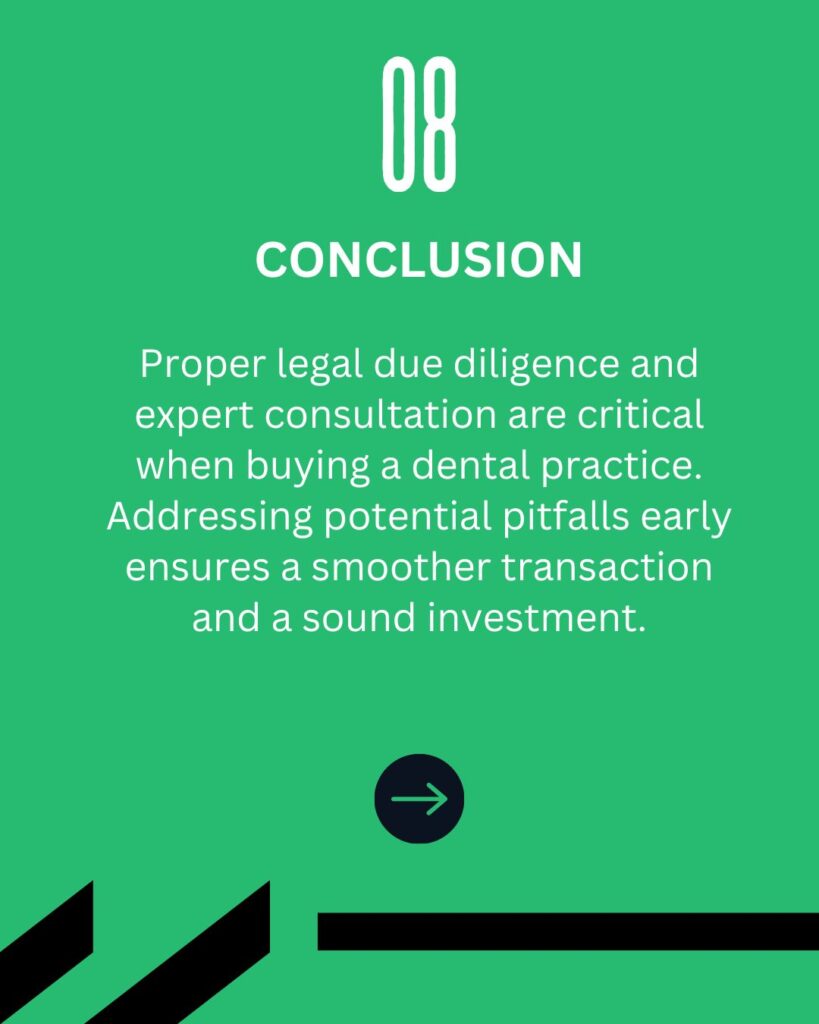
Learn more: Related Articles
7 Legal Pitfalls to Avoid When Buying a Dental Practice FAQ
Why is it important to review contracts when purchasing a dental practice?
Reviewing contracts when purchasing a dental practice is crucial to identify any legal obligations, such as employee agreements, property leases, and restrictive covenants that may limit your operations. Contracts also outline financial terms, liabilities, and warranties that protect you from future disputes. Ensuring that contracts are clear and favorable helps prevent unexpected costs or legal issues after the purchase, safeguarding your investment and smooth business operations.
What are the common legal pitfalls in buying a dental practice?
Common legal pitfalls when buying a dental practice include not thoroughly reviewing contracts, such as employee agreements or property leases, which may carry hidden liabilities. Failure to conduct due diligence on the financial health of the practice or overlooking restrictive covenants can limit your operational flexibility. Additionally, incorrectly transferring NHS contracts or failing to understand tax obligations can lead to financial and legal complications. It’s crucial to address these issues to avoid future disputes and protect your investment.
How do restrictive covenants affect a dental practice acquisition?
Restrictive covenants in a dental practice acquisition can limit your ability to operate within a certain geographic area or offer specific services after the purchase. These covenants are often designed to protect the seller’s remaining interests, like preventing competition. If not reviewed carefully, they can restrict your growth potential or expansion plans. It’s essential to understand the scope and duration of these covenants to ensure they don’t hinder your business operations.
What legal documents should I review during due diligence?
During due diligence for a dental practice acquisition, important legal documents to review include:
- Purchase Agreement: Defines the terms of the sale.
- Employee Contracts: Ensures awareness of staff rights and obligations.
- Lease Agreements: Reviews property obligations and restrictions.
- NHS or private contracts: Ensures proper transfer of patient services.
- Tax Records: Checks for liabilities.
- Warranties and Indemnities: Protects against future claims.
Thoroughly reviewing these documents safeguards your investment and prevents future legal issues.
What are the risks associated with property leases when buying a practice?
When buying a practice, risks associated with property leases include hidden costs like rent escalations, service charges, and repair obligations that may not be apparent initially. Long-term lease commitments can limit your flexibility if you want to relocate or expand, and restrictive terms might prevent modifications to the property. Additionally, unclear lease renewal terms can create uncertainty regarding your tenure, affecting the stability of your practice in the long run.
How do employment contracts impact the purchase of a dental practice?
Employment contracts impact the purchase of a dental practice by transferring existing employee rights and obligations to the new owner. You may inherit contractual commitments such as salaries, benefits, and working conditions, as well as any potential liabilities related to employment disputes. It’s crucial to thoroughly review these contracts to ensure alignment with your business goals and to identify any risks, such as restrictive terms or costly benefits, that could affect the practice’s profitability after acquisition.
What are the tax liabilities when buying a dental practice?
When buying a dental practice, tax liabilities can include Stamp Duty Land Tax (SDLT) on property purchases, Capital Gains Tax (CGT) on assets, and VAT if applicable. It’s important to assess the tax status of the business to avoid unexpected liabilities. Additionally, how the deal is structured—whether as an asset or share purchase—affects tax treatment. Consulting with a tax advisor ensures you understand these implications and can plan effectively.
How do warranties and indemnities protect the buyer?
Warranties and indemnities protect the buyer by providing legal assurances from the seller regarding the condition and performance of the dental practice. Warranties are statements confirming key facts about the business (e.g., financial health or ownership of assets), while indemnities protect the buyer from specific liabilities or future claims. If these warranties are breached or undisclosed issues arise, the buyer can seek compensation, safeguarding against unexpected financial risks after the purchase.
What should I look for in the purchase agreement for a dental practice?
In a dental practice purchase agreement, you should look for key elements such as the purchase price and payment terms, asset or share purchase details, and any warranties and indemnities provided by the seller. Review employee and property transfer terms, any restrictive covenants, and the completion date. Ensure it includes a clear plan for handling existing NHS contracts and patient lists. Understanding these elements is crucial to avoid future disputes and financial risks.
How do transfer of assets differ from share purchases in dental practices?
The main difference between an asset purchase and a share purchase in dental practices lies in what is transferred. In an asset purchase, the buyer acquires specific assets of the practice, such as equipment, patient lists, or property, without inheriting liabilities. In a share purchase, the buyer acquires the entire company, including both its assets and liabilities. Asset purchases offer more control over what is bought, while share purchases allow for a more seamless transfer of ownership.
What legal issues arise from intellectual property when buying a practice?
When buying a dental practice, intellectual property (IP) issues can arise concerning ownership of the practice name, logo, trademarks, patient records, and marketing materials. It’s important to ensure that these assets are properly transferred and legally owned by the buyer. Misunderstandings regarding who holds rights to the branding or IP could lead to legal disputes. Reviewing any IP-related agreements or registrations during due diligence helps avoid complications and ensures full ownership post-purchase.
How do Care Quality Commission (CQC) regulations affect dental practice purchases?
Care Quality Commission (CQC) regulations affect dental practice purchases by requiring the new owner to meet CQC standards for patient safety, quality of care, and facility management. The buyer must register with the CQC before taking ownership and ensure that the practice adheres to regulatory requirements. Failing to comply with these standards can result in penalties or delays in the transfer process. It’s essential to review the practice’s CQC compliance history during due diligence to avoid future issues.
What are the consequences of failing to transfer NHS contracts correctly?
Failing to correctly transfer NHS contracts when buying a dental practice can result in losing the NHS contract, which is vital for practices providing NHS treatments. This can lead to financial losses and disruptions in patient care. The new owner must follow proper legal procedures to ensure the contracts are transferred smoothly, including notifying NHS authorities and adhering to their requirements. Failure to comply can lead to contract termination, regulatory issues, and potential reputational damage.
How can I avoid future liabilities after purchasing a dental practice?
To avoid future liabilities after purchasing a dental practice, conduct thorough due diligence to uncover any hidden financial or legal risks. Ensure that employee contracts, property leases, and supplier agreements are reviewed for potential liabilities. Verify the practice’s compliance with regulatory bodies like the CQC and ensure proper transfer of NHS contracts. Use warranties and indemnities in the purchase agreement to protect yourself against unexpected claims. Consulting legal and financial experts can further help mitigate future liabilities.
Why is it essential to have a solicitor when buying a dental practice?
Having a solicitor when buying a dental practice is essential to ensure the legal aspects of the transaction are properly handled. A solicitor reviews contracts, identifies potential liabilities, ensures compliance with regulatory requirements (like CQC registration), and safeguards the proper transfer of assets and NHS contracts. They also help negotiate favorable terms, protect you from legal pitfalls, and provide advice on warranties, indemnities, and restrictive covenants. Their expertise ensures a smooth, legally sound acquisition process.
About the Author

Arun Mehra
With almost twenty years of commercial experience and knowledge in Dentistry, Arun’s expertise is valued by hundreds of businesses across the UK. His financial acumen and know-how, along with his hands-on commercial expertise have helped clients, large and small, new and established to achieve great things.
Arun is the founder of the Samera Group, starting the business with just one client sitting at his father’s dining table. Fifteen years on, Team Samera now service hundreds of Dental clients, run exciting events, help clients raise finance, and are very active in helping clients buy or sell Dental practices.
Buying a Dental Practice: Get Started
When buying a dental practice (especially if it’s for the first time), you need the competent hands of qualified professionals. Not only have we been helping the UK’s dentists to buy, start and sell dental practices for over 20 years, we are dental practice owners ourselves! We know what it takes to buy the right dental practice, we can help you find it, buy it and get it up and running.
Book a free, no-obligation consultation with one of our team at a time that suits you (including evenings). We’ll call you back and have a chat about how we can help buy your dream practice.
With Samera Business Advisors you can rest easy knowing that your investment is secure and your future is brighter. Contact us today so we can help plan for your tomorrow.
Learn More: Buying a Dental Practice
For more information please check out the articles and webinars in the buying a dental practice section of our Learning Centre like the Guide to Buying a Dental Practice.
Make sure you never miss any of our articles, webinars, videos or events by following us on Facebook, LinkedIn, YouTube and Instagram.



